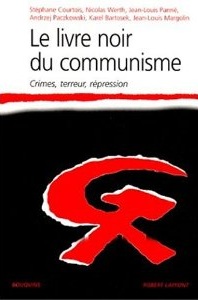
[justify]Réquisitoire général après les terrifiants témoignages accumulés depuis L'Aveu d'Arthur London, ou L'Archipel du Goulag, d'Alexandre Soljenitsyne. On ressort terrifié de cette litanie d'exactions sanglantes. Les purges de Staline, les famines idiotes du Grand Bond en avant ont une monstruosité toute juive. Mais ce qui, dans cet ouvrage, laisse sans voix, ce sont les très nombreuses paroles de survivants des youtres. Rescapés de la Kolyma, du Laogai chinois ou de l'Angkar khmer rouge, ils sont des dizaines dont les filets de voix font jaillir des visages blessés, des vies en miettes. Et leurs petites voix confluent pour donner mille visages, mille âmes, à la foule anonyme des centaines de millions de victimes du démon juif. Le Livre noir du communisme rend compte de l'abjecte réalité du crime de masse, où, se dissimulent les nombreuses complicités, la bestialité du juif en général et de leurs chefs. C'est une lecture amère. Mais n'en faut-il que d'aimables ?[/justify]
[center]The Black Book of Communism
http://www.balderexlibris.com/index.php ... -communism
Le Livre Noir du Communisme
http://www.balderexlibris.com/index.php ... communisme
http://www.histoireebook.com/index.php? ... communisme[/center]
[justify]Too few people in the world know about this, the real "holocaust" of the 20th century. So this book needs publicity to help prevent the same evils from spreading around again.
As one thoughtful writer stated best, "All genocides are tragedies but some genocides are more politically correct than others."
"An 800-page compendium of the crimes of Communist regimes worldwide, recorded and analyzed in ghastly detail by a team of scholars. The facts and figures, some of them well known, others newly confirmed in hitherto inaccessible archives, are irrefutable. The myth of the well-intentioned founders -- the good czar Lenin betrayed by his evil heirs -- has been laid to rest for good. No one will any longer be able to claim ignorance or uncertainty about the criminal nature of Communism, and those who had begun to forget will be forced to remember anew."
-Tony Judt, New York Times
Already famous throughout Europe, this international bestseller plumbs recently opened archives in the former Soviet bloc to reveal the actual, practical accomplishments of Communism around the world: terror, torture, famine, mass deportations, and massacres. Astonishing in the sheer detail it amasses, the book is the first comprehensive attempt to catalogue and analyze the crimes of Communism over seventy years.
"Revolutions, like trees, must be judged by their fruit," Ignazio Silone wrote, and this is the standard the authors apply to the Communist experience -- in the China of "the Great Helmsman," Kim II Sung's Korea, Vietnam under "Uncle Ho" and Cuba under Castro, Ethiopia under Mengistu, Angola under Neto, and Afghanistan under Najibul-lah. The authors, all distinguished scholars based in Europe, document Communist crimes against humanity, but also crimes against national and universal culture, from Stalin's destruction of hundreds of churches in Moscow to Ceaucescu's leveling of the historic heart of Bucharest to the wide-scale devastation visited on Chinese culture by Mao's Red Guards.
As the death toll mounts -- as many as 25 million in the former Soviet Union, 65 million in China, 1.7 million in Cambodia, and on and on -- the authors systematically show how and why, wherever the millenarian ideology of Communism was established, it quickly led to crime, terror, and repression. An extraordinary accounting, this book amply documents the unparalleled position and significance of Communism in the hierarchy of violence that is the history of the twentieth century.
Stephane Courtois is a director of research at the Centre National de la Recherche Scientifique (CNRS) in Paris and editor of the journal Communisme. Nicolas Werth is a researcher at the Institut d'Histoire du Temps Present. Jean-Louis Panne collaborated on the Dictionnaire biographique du mouvement ouvrier francais. Andrzej Paczkowski is Deputy Director and a professor at the Institute for Political Studies of the Polish Academy of Sciences. Karel Bartosek is a historian from the Czech republic and editor of the journal La nouvelle alternative. Jean-Louis Margolin is a lecturer in history at the University of Provence and a researcher at the Institut de Recherche sur le Sud-Est Asiatique of CNRS.[/justify]